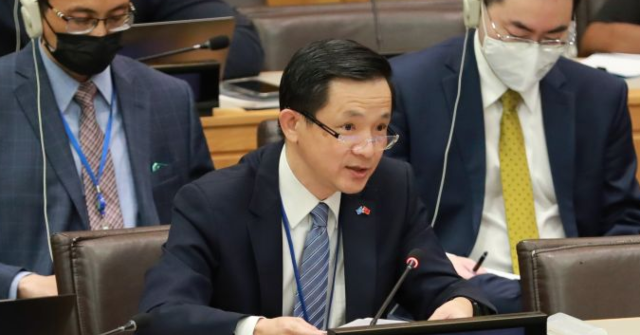The Chinese ambassador to Seoul, Dai Bing, applauded the leftist administration of South Korean President Lee Jae-myung for its “commitment” to attacking anti-communist voices in the country after Lee described conservative assemblies as “hate rallies” and reports indicated some conservative activists are facing police questioning.
“I have noticed that the South Korean side recently held a State Conference emphasizing the need to take proactive measures to prevent discrimination and violence against foreigners,” Dai wrote in a message posted to Twitter, a social media site banned in China, “specifically mentioning issues related to anti-China protests.”
“I appreciate the high-level attention from the South Korean side and their commitment to taking measures,” he continued. “Amid the current complex and turbulent international situation, strengthening friendly cooperation between China and South Korea is in the interest of both sides and aligns with the common expectations of our peoples.”
Dai disparaged “certain forces… smearing China,” but expressed optimism that any bilateral issues could be “solved soon.”
South Korea has endured a period of intense, though largely peaceful, political upheaval following Lee’s narrow defeat in the 2022 presidential election to Yoon Suk-yeol, an ardent anti-communist conservative. Yoon attempted to impose military rule on the country in December, alarming citizens and prompting the National Assembly to invalidate his martial law within hours. Yoon was impeached and removed from office in April and Lee won the special election to replace him in June.
Given the turbulent situation, multiple conservative groups that still support Yoon have condemned Lee’s election and blamed it on alleged foreign interference, particularly from China. Protesters have nonetheless peacefully assembled to condemn communist China and accuse it of maliciously interfering in Korean politics. While neither the South Korean government nor international observers have questioned the legitimacy of the special election, global intelligence agencies and human rights groups have repeatedly identified China as a significant actor meddling in the foreign affairs of other states, particularly by spreading pro-China propaganda and establishing illegal police stations in foreign countries to silence international opposition.
During a cabinet meeting on Tuesday, Lee called anti-China protests in Seoul “hate rallies” and claimed they were “rife with profanity and hateful remarks that went beyond freedom of expression.” A description of his remarks by the left-leaning Korean outlet Hankyoreh noted that Lee lumped the peaceful protests in with abuses against migrant workers and “human rights violations.”
Lee was quoted as stating that there “appear to be many cases recently in which hatred, discrimination, and violence against foreign nationals and the socially disadvantaged have been an issue” and ominously demanded his officials take “necessary measures” against these alleged cases.
“Not long ago, there were hateful demonstrations in [the Seoul neighborhood of] Daerim and in front of Chinese diplomatic offices where the insulting language and violence exceeded the bounds of freedom of expression,” Lee recalled. “In no way does it accord with the Republic of Korea’s stature as a model example of democracy that values diversity and inclusiveness.”
Lee’s statements were especially alarming in the context of reports this week indicating that police had opened an investigation into a conservative group known as “Freedom University” for allegedly tearing up a Chinese flag. South Korean news outlets reported that the flag in question bore the likenesses of genocidal dictator Xi Jinping and Chinese Ambassador Dai Bing. South Korea outlaws insults against foreign diplomats and foreign embassies, punishable by up to three years in prison.
Freedom University had organized an anti-communist peaceful rally on July 22 before the Chinese Embassy in Seoul, one of the events Lee appeared to refer to when he condemned “hate rallies.” The rally’s objective was to condemn alleged “election fraud.”
Prior to the Freedom University incident, Lee had already suggested an interest in censoring conservative voices. During another cabinet meeting in June, Lee complained that “fake news” on YouTube had become a threat to the country.
“There are too many instances where fake news is used to earn money,” Lee was quoted as saying. “Resorting to illegal actions to earn money should be fundamentally prevented.”
Outside of Lee’s comments personally, his administration has emphasized its desire to improve relations with China, which soured under the anti-communist Yoon, who focused more heavily on bolstering ties to America. Foreign Minister Cho Hyun told reporters on Thursday that the Lee administration was working to “seek common ground while managing differences” with China, a message the Chinese state propaganda outlet Global Times received warmly.
“While negative voices and incidents still exist, the overall trajectory is positive,” one of the Global Times’ regime-approved academic experts celebrated, referring to the China-South Korea relationship. “What matters is whether Seoul turns its words into concrete actions, such as addressing unlawful insults toward Chinese people outside its embassy and tempering irrational anti-China sentiment at home.”
The Times also applauded Lee for condemning the alleged “hate rallies.”
Follow Frances Martel on Facebook and Twitter.
Read the full article here
